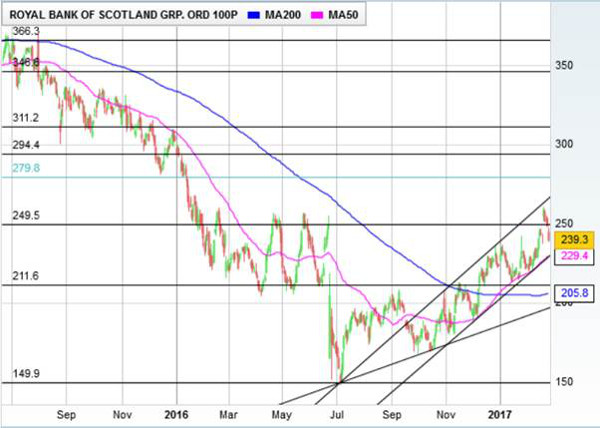RBS crushed by £10bn of costs
24th February 2017 13:28
by Lee Wild from interactive investor
Share on
had "another difficult year" in 2016, reporting its ninth consecutive annual loss. The level of hardship at the bailed-out bank is illustrated perfectly by a hefty £7 billion loss, three times the deficit in 2015. There's no way chiefs could spin it any other way, although they gave it a good try.
RBS made an operating loss of £4.08 billion last year and an attributable loss of £6.96 billion versus deficits of £2.70 billion and £1.98 billion the year before.
Numbers this time included around £10 billion of one-offs, including litigation costs of £5.87 billion, restructuring costs of £2.11 billion, a £1.19 billion cheque to its Treasury owners to pave the way for a return to the dividend list, plus other impairments.
Strip out all the uglies and RBS made an adjusted operating profit of £3.67 billion, but even that was £731 million, or 17% less than in 2015.
"It is hard to present that as a positive outcome for shareholders," admitted chairman Howard Davies, "though in fact it does reflect the impact of stronger efforts to resolve the bank's legacy problems.
"As a result, the bank is better placed than it was a year ago, though there are still some sizeable legacy problems to resolve."

These results come just days after RBS announced it had ripped up plans to sell its branch network - Williams & Glyn (W&G). And this legacy of the financial crisis could soon be put to bed. Agreeing fines in the US for its part in the subprime mortgage scandal might also be settled shortly.
And a disappointed chief executive Ross McEwan made use of Edinburgh-based RBS's 480-page annual report to focus on the positives.
"We were the fastest growing large bank in the UK last year, with £24 billion of new lending into the UK economy supporting over a million businesses and home owners.
"This bank has great potential. We believe that by going further on cost reduction and faster on digital transformation we will deliver a simpler, safer and even more customer-focused bank."
Sort out the legacy issues, which will begin to take up far less of management's time, and "we aim to have RBS back into profit in 2018," wrote the bank.
Optimism
There was optimism on Monday when the lender flagged those alternative plans for W&G, but it's proving hard work convincing investors that today's numbers are a good result or, indeed, that things are looking up.
RBS shares are down over 4% in an already weak market where the FTSE 100 currently languishes near a two-week low. Charts say a test of the RBS trendline, currently at about 230p, is possible. And that also coincides with the price target of Jason Napier, banks analyst at UBS.
Fourth-quarter numbers at the all-important core franchises missed forecasts by about 13%, said Napier, with Ulster bank the only division beating estimates, and that was only because of bad debt write-backs.
"Credibility on planned cost cuts and capital release from Capital Resolution [the business set up to sell or wind down overseas assets] (and Core too, now) is required to sustain investors," he writes.
"With 4Q16 Franchise performance soft, but 2020 [return on tangible equity] targets well in excess of current valuation, share-price performance will be down to fears around litigation and restructuring costs versus confidence in longer-term delivery."
We said on Monday that "buying ahead of results on Friday is fraught with risk". It was. RBS was "not an obvious buy" either. It still isn't, but settling the US toxic mortgage scandal and receiving EU backing for its W&G plan will certainly be progress.
When investors get a sniff that RBS can really make first profit in a decade in 2018, the shares will surely re-rate.
This article is for information and discussion purposes only and does not form a recommendation to invest or otherwise. The value of an investment may fall. The investments referred to in this article may not be suitable for all investors, and if in doubt, an investor should seek advice from a qualified investment adviser.